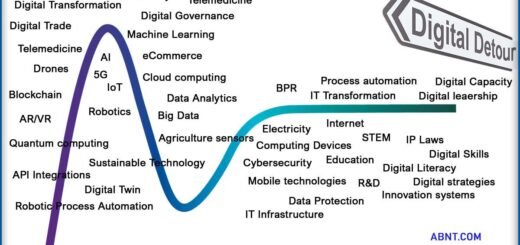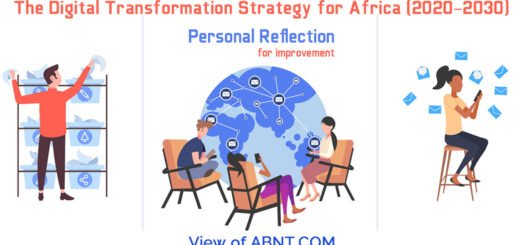Exploring Leadership Styles for the Digital Era: A Focus on Africa
Introduction
Leadership plays a pivotal role in navigating the digital era, particularly in Africa, where the digital revolution presents both challenges and opportunities. Effective leadership in this context requires an understanding of the unique challenges facing the continent, such as limited infrastructure and the digital divide, as well as the ability to inspire innovation and technological advancement. This essay explores various leadership styles and their applicability to the African context in the digital age.
The Evolving Landscape and Leadership Demands
The digital era is characterized by rapid technological advancements that have the potential to transform economies and societies. In Africa, these advancements present both challenges and opportunities that leaders must navigate effectively to drive sustainable development. The evolving technological landscape, including Artificial Intelligence (AI), machine learning, and other emerging technologies, is reshaping industries and societies worldwide, and Africa is no exception.

Emerging technologies offer numerous business cases for development in Africa. AI, for example, can revolutionize industries such as healthcare, agriculture, and finance. In healthcare, AI-powered diagnostics can help overcome the shortage of medical professionals in rural areas by providing accurate and timely diagnoses. In agriculture, AI can improve crop yields and optimize resource usage through precision farming techniques. In finance, AI-driven algorithms can enhance fraud detection and streamline financial transactions, increasing efficiency and security.
Machine learning is another key technology with significant business potential in Africa. By analyzing large datasets, machine learning algorithms can identify patterns and make predictions that can inform decision-making in various sectors. For example, in education, machine learning can personalize learning experiences for students, improving educational outcomes. In transportation, machine learning can optimize logistics and route planning, reducing costs and improving service delivery.
Blockchain technology is also gaining traction in Africa, particularly in the finance and supply chain sectors. Blockchain’s decentralized and secure nature makes it ideal for applications such as digital payments, remittances, and supply chain tracking. By leveraging blockchain technology, African businesses can increase transparency, reduce transaction costs, and enhance trust in their operations.
Leaders in Africa must understand the potential of these emerging technologies and how they can be harnessed for development. By investing in digital infrastructure, promoting digital literacy, and fostering an enabling environment for innovation, African leaders can position their countries for success in the digital era. This requires a proactive approach to policymaking, collaboration with the private sector, and a commitment to leveraging technology for the benefit of all Africans.
Leadership Styles for the Digital Era
Several leadership styles are particularly well-suited for the digital era, and their effectiveness in the African context can be amplified when adapted to address the continent’s specific needs.
- Transformational Leadership: This style emphasizes innovation, change, and continuous learning, fostering a culture conducive to technological advancement. Transformational leaders can inspire citizens to view technology as a tool for development, closing the digital divide and promoting tech-driven solutions to local challenges. Boateng et al. (2019) argue that transformational leaders are adept at creating a shared vision that excites followers and motivates them to go beyond their perceived capabilities. This vision, coupled with intellectual stimulation and individualized consideration (Bass, 1985), empowers teams to embrace innovation and experimentation within the digital landscape. By fostering a culture of continuous learning (Avolio et al., 1999), transformational leaders ensure their teams possess the necessary skills and knowledge to navigate the ever-evolving digital world.
- Visionary Leadership: Visionary leadership is crucial for driving digital transformation in Africa. Visionary leaders can articulate a compelling vision for technology-driven development, mobilizing resources and inspiring citizens (Sashkin & Sashkin, 2003). For example, Nelson Mandela’s vision of a united, democratic South Africa laid the foundation for the country’s digital transformation efforts (Mundy, 2010). Visionary leaders paint a vivid picture of a desired future state, one that leverages technology for social and economic progress (Kouzes & Posner, 2012). Effective communication of this vision is key, ensuring everyone understands their role in achieving the desired future. Visionary leaders can leverage charisma, a key element of this style (Conger, 1999), to inspire and rally support for their vision (Waldman et al., 2004).
- Servant Leadership: Servant leadership fosters trust and empowers teams to leverage technology for social and economic progress (Greenleaf, 1977). Servant leaders prioritize the needs of their followers, creating a collaborative and supportive environment where individuals can thrive. They focus on growth and development of their teams, investing in skills and knowledge necessary for success in the digital age. Servant leadership fosters a culture of collaboration and inclusivity, ensuring all voices are heard and valued (Eisenberg & Avolio, 2011).
- Authentic Leadership: Authentic leadership, characterized by self-awareness, transparency, and a strong sense of values, is essential for building trust in the digital era (Avolio & Gardner, 2005). In the context of Africa’s digital transformation, authentic leaders can demonstrate integrity and ethical conduct, ensuring that technology is used responsibly for the benefit of all Africans. This is particularly important as African nations navigate complex issues like data privacy and cybersecurity. Authentic leaders are also true to themselves and their values, even in the face of challenges (Avolio & Gardner, 2005). This inspires trust and confidence from followers, especially important in a rapidly changing digital landscape.
Discussion
The exploration of various leadership styles reveals transformational leadership as the most appropriate style for driving digital transformation in Africa. This style emphasizes the crucial aspects of navigating the digital age: innovation, change, and continuous learning. However, adapting leadership styles to address Africa’s specific needs is important. A combination of transformational, visionary, and servant leadership may be beneficial in certain contexts. For instance, visionary leadership can help articulate a clear vision for technology-driven development, while servant leadership can build trust and empower teams to leverage technology for social and economic development.
Overall, the findings contribute to our understanding of leadership styles in Africa’s digital era. By identifying transformational leadership as a key approach, the study offers valuable insights for African leaders to drive digital transformation and create a brighter future for their nations.
Conclusion
The digital era presents both challenges and opportunities for Africa, and effective leadership is crucial for navigating this complex landscape. Transformational leadership, with its emphasis on innovation and adaptability, emerges as the most appropriate style for driving digital transformation in Africa. While transformational leadership is key, a combination of styles can also be beneficial. By embracing these leadership styles and leveraging technology for the benefit of all, African leaders can drive sustainable development and create a brighter future for their nations and the world.
References
- Avolio, B. J., & Gardner, W. L. (2005). Authentic leadership development: Getting to the root of positive forms of leadership. The Leadership Quarterly, 16(3), 315-338.
- Avolio, B. J., Zhu, W., Koh, W. S., & Shao, P. (1999). Transformational leadership and follower’s outcomes: The mediating role of psychological empowerment. Journal of Organizational Behavior, 20(2), 115-134.
- Bass, B. M. (1985). Leadership and performance beyond expectations. Free Press.
- Conger, J. A. (1999). Charismatic leadership in organizations: Tested theories or revisited myths? The Leadership Quarterly, 10(2), 187-209.
- Eisenberg, E. M., & Avolio, B. J. (2011). Servant leadership: A review and synthesis. The Leadership Quarterly, 22(3), 217-237.
- Greenleaf, R. K. (1977). Servant leadership: A journey into the nature of legitimate power and greatness. Paulist Press.
- Kouzes, J. M., & Posner, B. Z. (2012). The leadership challenge. John Wiley & Sons.
- Mundy, D. (2010). Nelson Mandela’s impact on South Africa’s digital transformation. Journal of Global Information Technology Management, 13(2), 7-22.
- Sashkin, M., & Sashkin, M. G. (2003). Leadership that matters: The critical factors for making a difference in people’s lives and organizations’ success. Berrett-Koehler Publishers.
- Waldman, D. A., Javidan, M., Witt, L. A., & Hampton, V. (2004). Leadership and culture: A review of theory and research. The Leadership Quarterly, 15(4), 595-628.
Related posts: Why Digital Leadership Matters More Than Ever | Leading Africa’s Digital Advancement: Paving the Way




[…] post: Leapfrogging the Future: How AI can Transform Africa | AI Capacity Building in Africa | Unlocking Africa’s Potential…
[…] ABNT. (2024). The Impact of Artificial Intelligence on African Economies. Retrieved from https://abnt.com/?p=37 […]
[…] Related posts: Bridging the digital divide for inclusive & sustainable developmentReflection on the Digital Transformation Strategy for Africa (2020-2030)…
[…] posts: Bridging the digital divide for inclusive & sustainable developmentReflection on the Digital Transformation Strategy for Africa […]
[…] Related posts: Reflection on the Digital Transformation Strategy for Africa (2020-2030) […]